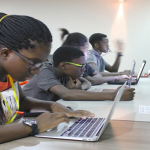School is over! The summer holidays are finally here and the children are looking forward to time for rest and fun! Your child thinks summer is a break from education. While summer can be a break from the classroom, you know it shouldn’t be a break from learning. There is a vast number of different summer camp activities to choose from. We encourage parents to research engaging and meaningful programs to register their children for. This includes the development of STEM skills.
LagosMums team had an Interview session with Jadesola Adedeji of STEM MET resources to demystify the STEM term.
What really is STEM?
STEM is an interdisciplinary approach to learning that combines aspects of Science, Technology, Engineering and Maths with real-life situations. The program actively engages students in the application of knowledge. It is hands-on, project-based learning.
This process reinforces the concept of “learning by doing” and seeks to develop multidisciplinary skills. STEM brings ‘real-life’ environment into the classroom, encouraging a practical application of theory being learned
The skills are also transferable into non-STEM related careers
What Happens at STEM METS
At STEM METS, our summer camps provide one example of active learning opportunities, where hands-on model building allows for math and engineering practice. Over the last 5 years, we have successfully run over 50 Holiday Workshops and engaged over 7,000 learners across our various S.T.E.M (Science, Technology, Engineering, and Maths) programs. Active learning puts the child in an activity that deeply engages the brain on many levels. Hands-on activities, practice by doing and critical discussion fall into this category -these projects don’t necessarily feel like learning. That means children are more likely to want to do them again and again. Translation: no more complaining or fighting with mum and dad!
What Skills are developed?
Learning Skills: Critical thinking, Communication, Collaboration( Teamwork), Creative thinking, Problem-solving, Analytical skills
Literacy Skills: Media literacy, Information literacy, Technology (Digital) literacy
Life Skills: Flexibility, Resilience, leadership, Initiative, Productivity and Social skills
Are there any misconceptions about STEM and what it means?
Yes, quite a lot of them. Some of which include:
a) STEM is coding! The popularity of coding has become rather prominent with parents having the impression that this is the language of the future without which, children may be considered illiterate and left behind in the classroom of the future. The technology aspect of STEM encompasses digital literacy, information literacy as well as some coding but the emphasis is really knowing how to use technology as an enabler for problem-solving, productivity and creativity. Therefore, some STEM programs may or may not involve screen time or any technology at all.
b) STEM is only for children interested in science! Not at all. Remembering that STEM programs are actually skills development learning program
c) STEM is a skill you learn in an instant! STEM skills are developed over time and reinforce skills with each experience and consistent exposure. Skills beget skills.
Is STEM a way of thinking? How can parents encourage this in their children?
Yes, the concept seeks to help children to learn HOW to think not WHAT to think. They thus should be able to assess, analyze a scenario/challenges/ situation with the data/information in front of them and then come up with solutions. Parents can help with even simple ‘projects’ at home like cooking, for example, is a great hands-on learning activity. Select a recipe with your child and then tackle it together. Practice measurements and fractions to demonstrate applied mathematics. Explain how ingredients react to show chemistry in real life. Calculate temperatures and cooking times, and then enjoy the tasty results!
What career/paths does STEM expose children to?
Skills are transferable into non-STEM related careers. STEM skills are essential regardless of the chosen career paths and have become even more in demand in the present and future workplace. STEM programs are tools for soft skills development with talent managers emphasizing the importance of soft skills. Research from the Society of Human Resources Management found that employers actually care more about soft skills than they do technical abilities.
Preparing children for the future workplace is key and equipping them with the necessary skills that they need for the future should be paramount
STEM camp
By offering a variety of interesting camp themes and programs to your children, boys and girls come ready to play and they leave with valuable experience practicing some aspects of STEM. We run the popular Bricks4kidz program, suitable for children ages 3-10 and recently our advanced robotics and coding program, The Little Engineers provides robust content for 11-16-year-olds
STEM skills can greatly diminish during the summer months, but we offer a unique approach to building STEM knowledge. Our summer camps focus on unique and fun projects that use LEGO® Bricks, amongst other hands-on activities and the results are incredible. Not only do kids have tons of fun, but they also combat summer learning loss by gaining real-life skills related to STEM, which they can apply when they get back in the classroom.
STEM Activities
Hands-on learning engages a child’s brain and brings difficult STEM concepts to life. Investing in your child’s sports teams or music hobbies is another fantastic investment that will pay dividends throughout his or her life. These skills will be retained in a child’s long-term memory so they are ready to head back to the classroom after the holidays — and beyond.
In addition to summer camps, you can do some active-learning activities at home with a little creativity and ingenuity. Cooking, for example, is a great hands-on learning activity. Select a recipe with your child and then tackle it together. Practice measurements and fractions to demonstrate applied mathematics. Explain how ingredients react to show chemistry in real life. Calculate temperatures and cooking times, and then enjoy the tasty results!
STEM is basic for child development…
Jadesola Adedeji is the CEO of STEM METS Resources, an educational service provider that is developing the next generation of creative thinkers that will provide solutions to local problems. www.stem-mets.com. Email: [email protected] ( References from Leap Ahead Learning.)

